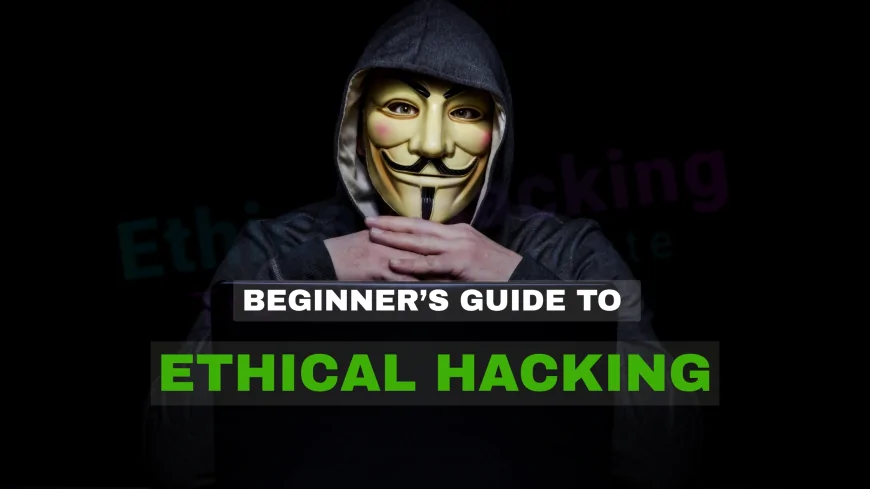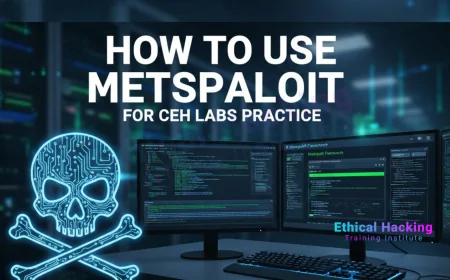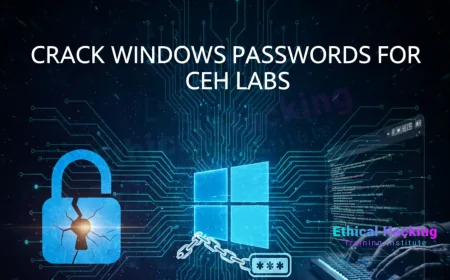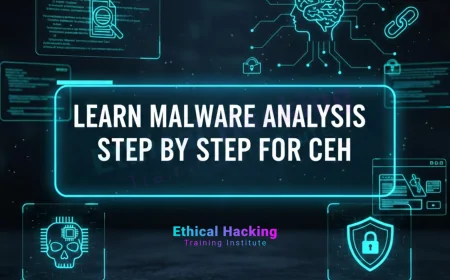Introduction to Ethical Hacking: The First Step in Becoming a Cybersecurity Professional | Start Your Cybersecurity Path with This Intro to Ethical Hacking
Discover how to begin your cybersecurity journey with an introduction to ethical hacking. Learn the basics, tools, mindset, and certifications needed to start a successful career in cybersecurity.

Table of Contents
- What Is Ethical Hacking?
- Why Start with Ethical Hacking?
- The Ethical Hacker's Mindset
- Core Technical Skills
- Essential Tools & Technologies
- Legalities & Ethics
- Learning Path & Resources
- Certifications & Courses
- Hands-On Practice & Labs
- Real-World Experience
- Career Roles & Salaries
- Common Challenges & Tips
- Advancement in Cybersecurity
- FAQs
- Conclusion
What Is Ethical Hacking?
It involves authorized attempts to breach system defenses in order to uncover security flaws before malicious hackers do. Also known as white-hat hacking, it involves the same skills, techniques, and mindset as malicious hackers—except used lawfully to improve an organization’s cybersecurity posture.
Authorized by organizations, ethical hackers expose security gaps to prevent potential attacks. They conduct penetration tests, simulate attacks, report security flaws, and recommend corrective actions to harden the systems against real threats.
Key Goals of Ethical Hacking:
- Identify vulnerabilities in applications, systems, and networks
- Evaluate and improve existing security policies and procedures
- Prevent data breaches, ransomware, and unauthorized access
- Support regulatory alignment with cybersecurity standards including GDPR, ISO 27001, and others.
Ethical vs. Malicious Hacking:
| Aspect | Ethical Hacking | Malicious Hacking |
|---|---|---|
| Intent | To improve security and prevent breaches | To exploit systems for personal or financial gain |
| Permission | Always performed with legal authorization | Illegal and without owner’s consent |
| Legality | Completely legal and regulated | Criminal offense punishable by law |
As cyber threats grow, ethical hacking remains a key element of proactive security. It empowers businesses to proactively detect weaknesses, secure sensitive data, and maintain customer trust. As cyber threats continue to evolve, the demand for ethical hackers grows, making it one of the most in-demand careers in the IT industry.
Why Start with Ethical Hacking?
Ethical hacking is an ideal starting point for anyone interested in cybersecurity because it introduces learners to real-world attack techniques, defensive strategies, and critical thinking—all from a legal and professional perspective. By learning how systems are breached, aspiring professionals develop a proactive mindset that is essential for defending digital infrastructure.
Key Reasons to Start with Ethical Hacking:
- Practical Skill Development: Ethical hacking is hands-on. You'll learn how to scan networks, exploit vulnerabilities, and test web apps, giving you technical depth early on.
- Real-World Relevance: Every organization—big or small—needs ethical hackers to find and fix security flaws before attackers do.
- Builds Foundational Knowledge: You’ll naturally gain knowledge of networking, operating systems, scripting, encryption, and application security.
- High Career Demand: There is a global shortage of cybersecurity professionals, with ethical hackers among the top in-demand roles.
- Immediate Career Paths: With basic ethical hacking knowledge and certifications, you can pursue entry-level jobs like SOC analyst or vulnerability assessor.
Learning Ethical Hacking Helps You:
- Understand how cyberattacks work and how to prevent them
- Use popular security tools (e.g., Nmap, Wireshark, Metasploit)
- Participate in bug bounty programs and real-world hacking simulations
- Improve problem-solving and logical thinking through simulated attack chains
Ethical Hacking as a Launchpad
Starting with ethical hacking opens doors to more advanced cybersecurity domains such as penetration testing, threat hunting, malware analysis, red teaming, and cloud security. It’s an empowering way to enter the industry—even if you don’t have a degree or prior IT background.
Whether you’re a student, career switcher, or tech enthusiast, ethical hacking gives you the technical, practical, and ethical framework to build a successful cybersecurity career from day one.
The Ethical Hacker's Mindset
- Curiosity & continuous learning
- Detail-oriented and methodical approach
- Ethical standards—stay within scope and document consent
- Problem-solving and adaptability in the face of evolving threats
Core Technical Skills
- Networking — TCP/IP, OSI model, routing, firewalls
- Operating Systems —Focus on Linux-based platforms like Kali/Ubuntu and explore key components of Windows internals.
- Scripting & Programming —Develop scripting skills in Python, Bash, and PowerShell to support ethical hacking tasks.
- Web Concepts — HTTP/HTTPS, DNS, APIs, HTML/JS basics
- Security Concepts — encryption, access control, authentication
Essential Tools & Technologies
- Nmap for network scanning
- Wireshark for packet analysis
- Metasploit Framework for exploitation
- Burp Suite or OWASP ZAP is commonly used for ethical hacking of web platforms.
- Ethical hackers rely on Hashcat or John the Ripper for efficient password hash cracking.
- Aircrack-ng for wireless network testing
Legalities & Ethics
- Obtain written permission (“scope”) before testing
- Abide by laws such as India’s IT Act 2000, and GDPR if in EU contexts
- Handle sensitive data responsibly with confidentiality
Learning Path & Resources
Begin with strong foundational courses:
- Networking & Linux: Coursera, Cybrary, Udemy starter courses
- Ethical Hacking Intro: TryHackMe “Complete Beginner” learning path
- Web App Hacking: OWASP WebGoat or Damn Vulnerable Web App
- Mobile & IoT Security: Android labs, IoT Playground
- Communities: Join Discord, GitHub, CTFTime, Reddit r/netsec
Certifications & Courses
- CompTIA Security+ — broad cybersecurity fundamentals
- eJPT — entry-level, practical pen testing cert
- Certified Ethical Hacker (CEH) — industry-recognized credential
- Offensive Security Certified Professional (OSCP) — hands-on technical benchmark
Hands-On Practice & Labs
Practice in controlled environments:
- Interactive platforms like TryHackMe and Hack The Box are essential for practical ethical hacking experience.
- Virtual machines like Metasploitable, OWASP Juice Shop
- Capture‑the‑Flag (CTF) events to sharpen analytical skills
Real-World Experience
- Participate in bug bounty programs on HackerOne and Bugcrowd
- Pursue internships or freelance work in cybersecurity
- Document your learning in blogs, GitHub repos, and walkthroughs
Career Roles & Salaries
- SOC Analyst — ₹4–7 LPA
- Junior Penetration Tester — ₹6–12 LPA
- Security Engineer — ₹12–20 LPA
- Bug Bounty Hunter — variable, based on findings
Common Challenges & Tips
- Avoid overwhelm by focusing on one domain at a time
- Use community when stuck—most learners share solutions
- Stay consistent—daily lab sessions beat cramming
- Track progress via lab completion logs and certifications
Advancement in Cybersecurity
- Progress to advanced certs: CEH Practical, OSCP, GPEN
- Focus your cybersecurity career in domains such as cloud, IoT, artificial intelligence, or forensics.
- Transition to leadership roles like Security Architect or CISO
FAQs
1. What is ethical hacking?
Ethical hacking is the authorized process of probing computer systems, networks, and applications to find and fix security vulnerabilities before malicious hackers can exploit them.
2. Is ethical hacking legal?
Yes, ethical hacking is legal as long as it is performed with proper authorization from the system owner and within the scope of permission.
3. Do I need a degree to become an ethical hacker?
No, while a degree can help, many ethical hackers build successful careers through certifications, practical experience, and online training platforms.
4. What are the basic skills required for ethical hacking?
You should have a solid understanding of networking, operating systems (especially Linux), basic programming/scripting, and cybersecurity fundamentals.
5. How long does it take to learn ethical hacking?
With consistent effort, beginners can gain a strong foundation in ethical hacking in 3–6 months. Mastery can take longer depending on specialization and practice.
6. Which certification should I pursue first?
The Certified Ethical Hacker (CEH) by EC-Council is a popular starting point, but others like CompTIA Security+ or eJPT are also great entry-level choices.
7. Can I learn ethical hacking online?
Yes, there are many trusted platforms such as TryHackMe, Udemy, Cybrary, and Coursera offering online ethical hacking courses with labs and certifications.
8. What tools do ethical hackers use?
Popular tools include Nmap, Wireshark, Metasploit, Burp Suite, John the Ripper, SQLmap, and Aircrack-ng for various stages of penetration testing.
9. What is a Capture the Flag (CTF) in ethical hacking?
CTFs are gamified cybersecurity challenges designed to simulate real hacking scenarios, helping learners sharpen their problem-solving and hacking skills.
10. Are ethical hackers in demand?
Yes, ethical hackers are highly sought after due to the rise in cyberattacks. There's a global shortage of skilled cybersecurity professionals.
11. What is the average salary of an ethical hacker?
In India, entry-level ethical hackers earn ₹4–8 LPA, while experienced professionals can earn ₹12–30 LPA or more depending on skills and certifications.
12. Can I get a job after completing an ethical hacking course?
Yes, especially if you pair your training with hands-on labs, certifications like CEH, and active participation in cybersecurity communities and bug bounties.
13. What is the difference between black hat and white hat hackers?
Black hat hackers break into systems illegally, while white hat (ethical) hackers use their skills legally to help secure systems.
14. What programming languages are useful for ethical hacking?
Python, Bash, JavaScript, and PowerShell are commonly used for writing scripts, automation, and exploiting vulnerabilities.
15. How do I practice ethical hacking safely?
Use legal platforms like TryHackMe, Hack The Box, or create your own virtual lab using Kali Linux and intentionally vulnerable machines like Metasploitable.
16. What is penetration testing?
Penetration testing (pen testing) is a simulated cyberattack on a system to evaluate its security. It is one of the core tasks of an ethical hacker.
17. Is CEH certification enough to get a job?
CEH adds credibility, but combining it with hands-on practice, a strong resume, GitHub projects, and networking increases your job prospects significantly.
18. What are some free resources to learn ethical hacking?
Resources like OWASP Juice Shop, DVWA, CTFtime, and Hack This Site offer free labs and challenges to develop ethical hacking skills.
19. How do I stay updated with cybersecurity trends?
Follow cybersecurity blogs, join forums like Reddit's r/netsec, participate in communities, and subscribe to advisories from CVE, NIST, or Hacker News.
20. What career paths can I pursue after ethical hacking?
You can specialize as a penetration tester, SOC analyst, threat hunter, malware analyst, or transition into cybersecurity management or architecture roles.
Conclusion
Introduction to ethical hacking offers both a technically rich and ethically grounded entry into cybersecurity. By mastering foundational networking, Linux, scripting, and using practical labs responsibly, beginners can build a solid career path. Combine structured learning, community involvement, certifications, and real-world experience to grow from novice to skilled cybersecurity professionals.
What's Your Reaction?
 Like
0
Like
0
 Dislike
0
Dislike
0
 Love
0
Love
0
 Funny
0
Funny
0
 Angry
0
Angry
0
 Sad
0
Sad
0
 Wow
0
Wow
0


















